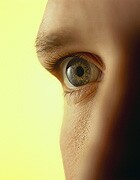
THURSDAY, May 7, 2015 (HealthDay News) — An American doctor who survived Ebola had traces of the virus in his eye fluid long after it was no longer present in his blood, his physicians say.
The finding suggests that other Ebola survivors should be monitored for possible Ebola-related eye problems, the doctors report in a new case study.
“The thousands of Ebola survivors in West Africa and health care workers in their home countries will need to be monitored for eye disease in the post-Ebola period,” said Dr. Steven Yeh, of the Emory Eye Center in Atlanta.
The patient is Dr. Ian Crozier, an infectious disease specialists who went to Sierra Leone last August to help with the Ebola outbreak in West Africa. He contracted Ebola within a few weeks and was evacuated to Emory University Hospital, where he arrived in critical condition.
During his recovery, Crozier developed severe uveitis, an inflammation of the middle layer of the eye that contains many of the eye’s blood vessels. The condition can destroy eye tissues and cause vision loss.
Doctors found that Crozier had Ebola virus in the clear fluid between his eye lens and cornea. The Ebola in the eye fluid was discovered 10 weeks after it was no longer detectable in his blood.
The case study, published May 7 in the New England Journal of Medicine, was to be presented Thursday at the annual meeting of the Association for Research in Vision and Ophthalmology, in Denver.
“The presence of viable Ebola virus in the eye could mean that other Ebola survivors may also be at risk for the development of uveitis,” Yeh said in a university news release.
More information
The U.S. Centers for Disease Control and Prevention has more about Ebola.
Copyright © 2026 HealthDay. All rights reserved.

